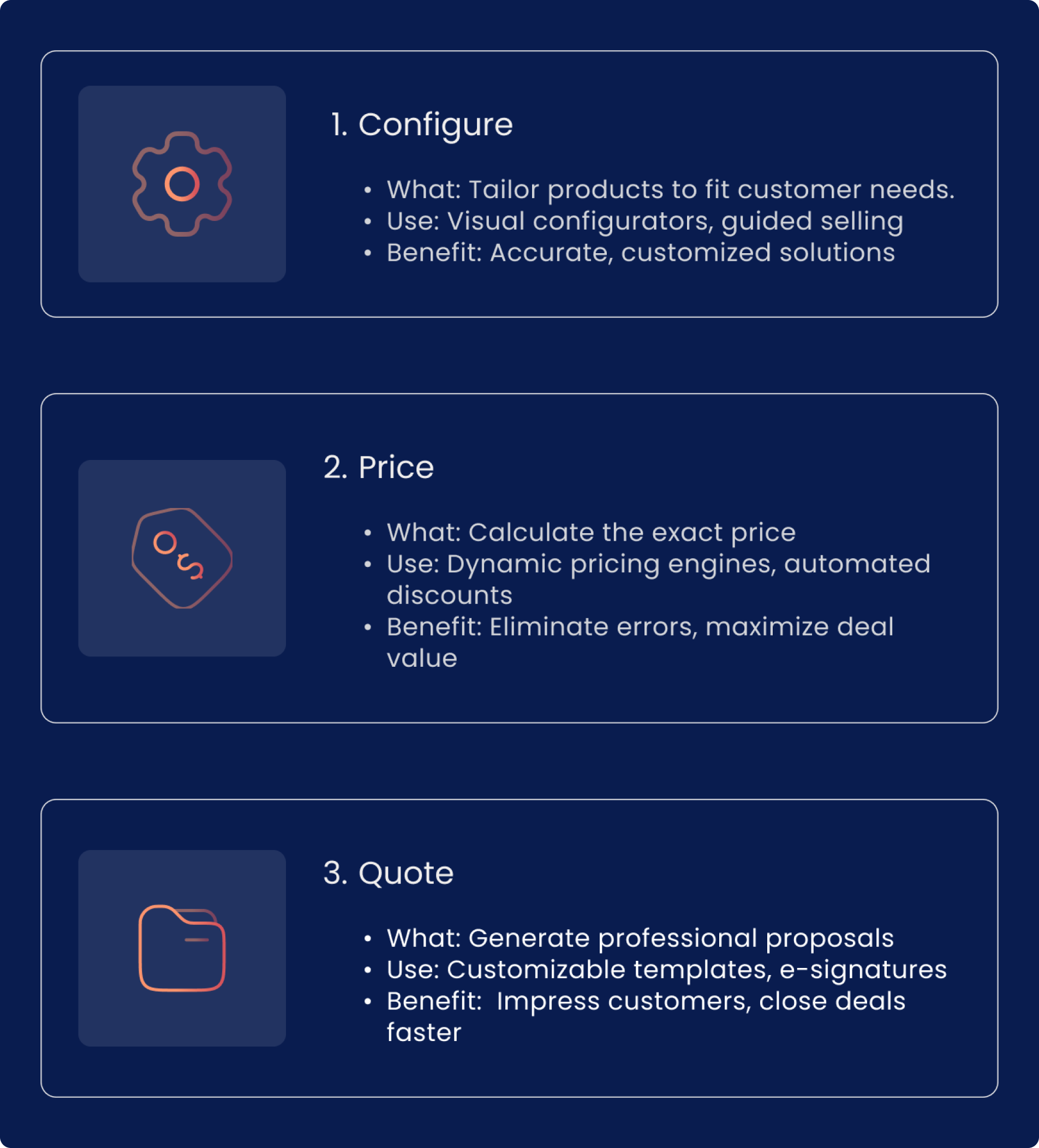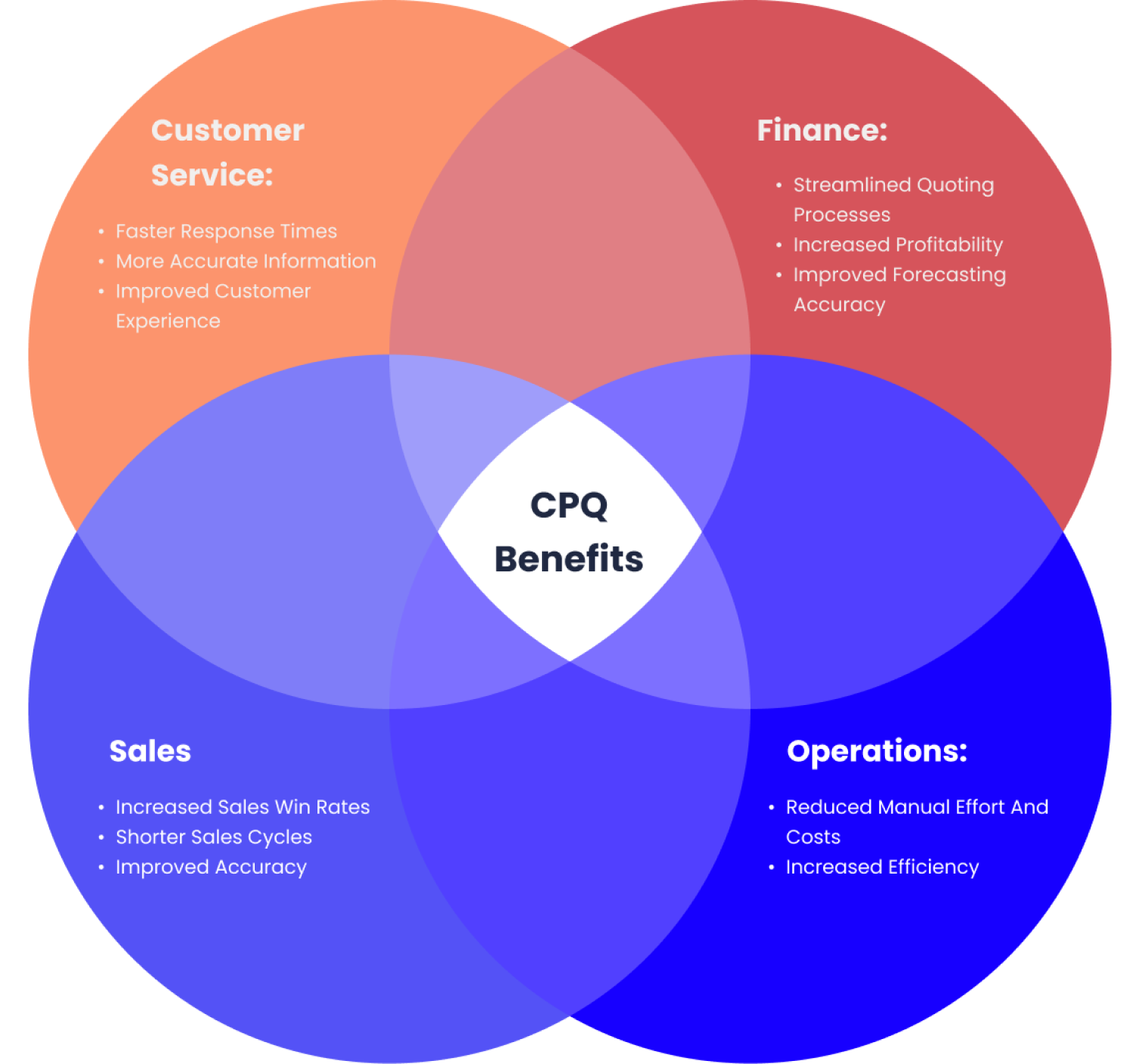What is CPQ
(Configure, Price, Quote)?
CPQ defined
CPQ helps companies sell complex products and services by simplifying the sales process. Here's what each part means:
- Configure: This is about choosing the right product options and customizations to meet a customer's needs. It's like building a custom computer online, where you select components such as the processor, RAM, and storage.
- Price: After configuring the product, the software calculates the price. This can get complex with discounts, promotions, and special deals, but CPQ handles it smoothly, ensuring the price is right.
- Quote: The final step is generating a detailed quote or proposal that the customer can review. This quote includes the configured product, its price, and any other necessary details.

By automating these steps, CPQ software speeds up the sales process, reduces errors, and helps businesses create accurate, tailored proposals that meet both their needs and those of their customers. Companies using CPQ software experience:
- A 28% faster quote generation process compared to those that do not use CPQ tools.
- A 10% increase in sales team productivity.
- A 5% increase in overall revenue.
This efficiency boost allows sales teams to focus more on customer interactions and closing deals. The improved accuracy and speed of the quoting process reduce delays and errors, leading to faster deal closures and enhanced customer satisfaction. CPQ users also achieve a 95% reduction in approval time for quotes, further speeding up the sales cycle. Overall, CPQ software not only streamlines sales processes but also contributes significantly to business growth and customer satisfaction by enabling precise and swift quote generation.

CPQ Software Explained
How It Works:
The software assists sales teams in creating quotes for products with multiple configuration options.It manages complex pricing structures and business rules to ensure that the quotes are accurate and optimized for the customer's needs
Key Features and Capabilities
- Product Configurator: A dynamic interface where users can select and customize products or services according to customer needs.
- Pricing Engine: Sophisticated algorithms to handle complex pricing structures, including discounts, bundles, and seasonal rates.
- Quote Generation: Automated systems to generate detailed and customized sales quotes, proposals, or contracts for customers.
- Data Analysis: Insightful data analysis on quoting trends, sales performance, and customer preferences, supporting strategic decision-making.
- Integrations: Seamless connections with CRM, ERP, and other business management systems for comprehensive data coherence and operational alignment.
This comprehensive functionality ensures that businesses can respond quickly and accurately to customer inquiries, reduce manual errors, and maintain consistency in sales operations.
Automate sales process with dynamic quoting and pricing
Ensure error free order handling and production
Scale your business into new markets
Benefits of Implementing CPQ
Implementing CPQ software reaps significant benefits for various departments within a company. Here are two examples:
- For Sales Teams: CPQ software provides sales representatives with the tools to quickly create accurate and customized proposals. This allows them to respond to customer inquiries with greater speed and precision, leading to increased sales and improved customer satisfaction.
- For Operations and Efficiency: CPQ optimizes operational efficiency by automating the quote-to-cash process, reducing manual entry, and minimizing errors. This streamlined process leads to more reliable data, better forecasting, and ultimately, more efficient operational management across the organization.

Industry-specific Applications of CPQ
CPQ software isn't one-size-fits-all. It adapts to different industries, enhancing each one's unique sales process.
- In the automotive industry, CPQ software can manage the various configurations of cars, allowing customers to customize their vehicle by choosing different features, such as the engine, color, and interior materials, with the system ensuring all selections are compatible and correctly priced.
- For room and layout planning sectors, CPQ can assist in designing office spaces or homes, integrating various furniture and fixture options into different layouts while providing real-time pricing updates as choices are made.
- In heavy industries like machinery or shipbuilding, CPQ tools can handle complex assemblies and components, calculating costs for custom engineering, materials, and labor, streamlining the proposal process for large-scale projects with numerous variables.
Integrating CPQ with Existing Systems
Integrating CPQ with existing systems like CRM, ERP, and CAD transforms the sales process into a seamless operation. This integration allows for real-time data synchronization across platforms, meaning any change in customer data or inventory levels is instantly updated, ensuring quote accuracy. Workflow automation then becomes a key benefit, as CPQ can trigger actions within CRM for follow-ups or initiate manufacturing processes in an ERP after a quote is accepted. This not only speeds up the entire sales cycle but also ensures that each department, from sales to production, operates with the same accurate data, reducing errors and increasing efficiency.

- CRM Integration: Integrating CPQ with CRM systems aligns sales data with customer information, allowing sales teams to create personalized quotes based on customer interactions and history. This connection ensures that all communications and quotes are tracked and managed from a central location.
- ERP Integration: Connecting CPQ to ERP systems enables a streamlined flow from sales quotes to order fulfillment. This ensures that inventory, supply chain data, and financial information are all reflected in the quotes provided to the customers, maintaining consistency across business operations.
- CAD Integration: For industries that rely on detailed designs, such as manufacturing, integrating CPQ with CAD systems allows for the automatic generation of quotes based on precise engineering specifications. This ensures that the products meet the exact requirements and that pricing reflects the design complexity.
- Data Synchronization: Data synchronization ensures that information across CRM, ERP, and CAD systems is consistent and up to date. When a sales rep quotes a product, the CPQ system automatically pulls the latest data, so quotes are always based on the most current information.
- Workflow Automation: Workflow automation with CPQ reduces manual tasks by automating steps like quote approvals and triggering production orders once a quote is accepted. This speeds up the sales cycle, reduces the potential for human error, and allows sales, finance, and production departments to operate more cohesively.
Advanced CPQ Features
Advanced CPQ features elevate the standard functionalities of configure, price, quote systems, introducing sophisticated tools designed for complex sales environments.
· Quote Approvals and Workflow Management:
This feature streamlines the process of getting quotes reviewed and approved by the necessary personnel. By setting predefined rules and approval hierarchies, CPQ ensures that quotes are accurate and meet business standards before being sent to customers. Automated workflows notify approvers, reducing delays and improving efficiency.
· Compliance and Governance:
CPQ software is designed to adhere to industry standards and regulations, ensuring that all quotes and sales activities comply with legal requirements. This includes managing data securely and applying pricing and discounting rules consistently to avoid compliance risks. By automating these aspects, CPQ helps businesses maintain governance standards effortlessly.
Choosing the Right CPQ Software
When choosing the right CPQ software, it's crucial to align your selection with business needs and goals.
- Selection Criteria and Process:
Start by identifying your specific requirements, such as product complexity, customization needs, and integration with existing systems. Consider scalability to support growth and the software's ease of use for your team. - Vendor Evaluation and Comparison:
Research potential vendors, focusing on their software capabilities, customer support, and development roadmap. Compare costs, including initial setup and ongoing operation, against the value and efficiencies the solution provides. This approach ensures you select a CPQ platform that fits both your current and future business needs.
Implementation and Adoption of CPQ
Implementing and adopting CPQ software effectively is key to maximizing its benefits.

- Best Practices for Deployment:
Begin with detailed planning. Identify your main goals, verify the accuracy of your data, and choose a phased approach for the rollout. Early engagement with all stakeholders is crucial to set expectations and gather necessary support. - Strategies for Training and User Adoption:
Tailor training programs to fit the different roles within your organization to facilitate better understanding and use of the CPQ system. Provide ongoing support and establish channels for feedback to address any issues swiftly, ensuring users gain confidence and the system meets organizational needs effectively.
Future Trends in CPQ Software
Looking ahead, CPQ technology is set to embrace AI and machine learning more fully. These advancements will allow for even smarter configuration options, dynamic pricing, and personalized quotes, all tailored to the customer's specific needs and past behaviors.
By analyzing data patterns, AI can offer predictive insights, suggesting optimizations for sales strategies and product offerings. Keep an eye on these innovations as they promise to make CPQ tools even more powerful in boosting sales efficiency and customer satisfaction.
Beyond AI, future CPQ trends may include enhanced integration capabilities, making it easier to connect with a broader range of systems and tools. Augmented Reality (AR) could allow sales teams to provide immersive product demonstrations. Blockchain technology might be used for secure, transparent contract management within the CPQ process.
Lastly, increased emphasis on user experience (UX) design will ensure CPQ platforms are more intuitive, reducing the learning curve and increasing adoption rates. These innovations aim to further streamline sales processes and enhance customer engagement.
Overall, CPQ software is a powerful tool that can help companies to streamline and automate their sales process, reduce errors and inconsistencies, speed up the sales process, improve customer experience and integrate with other systems. It allows sales teams to focus on high-value activities and close more deals with less effort. With the right CPQ solution in place, businesses can see a significant improvement in efficiency and revenue growth.
Try our Configurator Demo Live
Let’s build together.
We empower manufacturers to master product modeling, streamline quoting process, reduce errors, and ultimately deliver the tailored solutions that customers demand.

